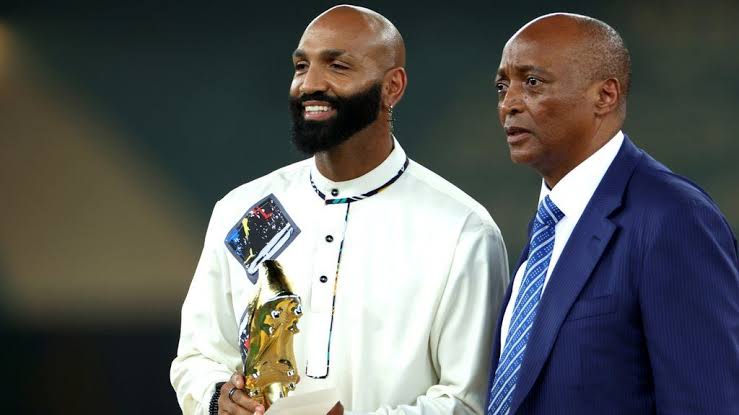FIFA has ruled that Emilio Nsue, the top scorer at the 2023 Africa Cup of Nations, was never eligible to play for Equatorial Guinea throughout his 11-year international career, Soccernet.football reports.
FIFA’s disciplinary committee also stripped Equatorial Guinea of two victories in 2026 World Cup qualifying matches held in November. Nsue, 34, scored in both 1-0 wins over Namibia and Liberia. However, FIFA determined he should not have played and has banned him from international football for six months.
This situation mirrors a 2013 decision when FIFA also ruled that Nsue was ineligible, causing Equatorial Guinea to forfeit two 2014 World Cup qualifiers. The latest investigation confirmed that Nsue, a former Spain under-21 player, had played competitive matches for Spain before gaining Equatorial Guinea nationality in March 2013.
Nsue made 26 appearances for Spanish youth teams until 2011. FIFA’s document, dated May 10, 2024, highlights the chaotic process the Equatorial Guinean Federation underwent to get Nsue approved.
In 2013, the federation asked Spanish authorities, but not FIFA, to release Nsue. He was selected for two World Cup qualifiers without proper authorization, leading to their cancellation. Despite FIFA rejecting his eligibility request in December 2013, Nsue continued to play for Equatorial Guinea.
FIFA judges noted that Nsue participated in many matches knowing he was ineligible. He played in qualifiers for the 2018 and 2022 World Cups and the 2015 Africa Cup of Nations, which Equatorial Guinea hosted. He also played in the 2022 Africa Cup of Nations.
Nsue has over 40 caps for Equatorial Guinea and has scored 23 goals, including five in the last AFCON. The recent publicity from his performance in Ivory Coast seems to have triggered the new disciplinary action.
FIFA opened the latest investigation in March, giving Nsue six days to respond, but received no reply. The judges stated they only acted against Nsue’s matches for the 2026 World Cup, an ongoing competition.
Nsue, now with the Spanish lower-tier team Intercity, and his national federation can appeal the sanctions to FIFA and the Court of Arbitration for Sport.FIFA has ruled that Emilio Nsue, the top scorer at the 2023 Africa Cup of Nations, was never eligible to play for Equatorial Guinea throughout his 11-year international career, Soccernet.football reports.
FIFA’s disciplinary committee also stripped Equatorial Guinea of two victories in 2026 World Cup qualifying matches held in November. Nsue, 34, scored in both 1-0 wins over Namibia and Liberia. However, FIFA determined he should not have played and has banned him from international football for six months.
This situation mirrors a 2013 decision when FIFA also ruled that Nsue was ineligible, causing Equatorial Guinea to forfeit two 2014 World Cup qualifiers. The latest investigation confirmed that Nsue, a former Spain under-21 player, had played competitive matches for Spain before gaining Equatorial Guinea nationality in March 2013.
Nsue made 26 appearances for Spanish youth teams until 2011. FIFA’s document, dated May 10, 2024, highlights the chaotic process the Equatorial Guinean Federation underwent to get Nsue approved.
In 2013, the federation asked Spanish authorities, but not FIFA, to release Nsue. He was selected for two World Cup qualifiers without proper authorization, leading to their cancellation. Despite FIFA rejecting his eligibility request in December 2013, Nsue continued to play for Equatorial Guinea.
FIFA judges noted that Nsue participated in many matches knowing he was ineligible. He played in qualifiers for the 2018 and 2022 World Cups and the 2015 Africa Cup of Nations, which Equatorial Guinea hosted. He also played in the 2022 Africa Cup of Nations.
Nsue has over 40 caps for Equatorial Guinea and has scored 23 goals, including five in the last AFCON. The recent publicity from his performance in Ivory Coast seems to have triggered the new disciplinary action.
FIFA opened the latest investigation in March, giving Nsue six days to respond, but received no reply. The judges stated they only acted against Nsue’s matches for the 2026 World Cup, an ongoing competition.
Nsue, now with the Spanish lower-tier team Intercity, and his national federation can appeal the sanctions to FIFA and the Court of Arbitration for Sport.
FIFA’s disciplinary committee also stripped Equatorial Guinea of two victories in 2026 World Cup qualifying matches held in November. Nsue, 34, scored in both 1-0 wins over Namibia and Liberia. However, FIFA determined he should not have played and has banned him from international football for six months.
This situation mirrors a 2013 decision when FIFA also ruled that Nsue was ineligible, causing Equatorial Guinea to forfeit two 2014 World Cup qualifiers. The latest investigation confirmed that Nsue, a former Spain under-21 player, had played competitive matches for Spain before gaining Equatorial Guinea nationality in March 2013.
Nsue made 26 appearances for Spanish youth teams until 2011. FIFA’s document, dated May 10, 2024, highlights the chaotic process the Equatorial Guinean Federation underwent to get Nsue approved.
In 2013, the federation asked Spanish authorities, but not FIFA, to release Nsue. He was selected for two World Cup qualifiers without proper authorization, leading to their cancellation. Despite FIFA rejecting his eligibility request in December 2013, Nsue continued to play for Equatorial Guinea.
FIFA judges noted that Nsue participated in many matches knowing he was ineligible. He played in qualifiers for the 2018 and 2022 World Cups and the 2015 Africa Cup of Nations, which Equatorial Guinea hosted. He also played in the 2022 Africa Cup of Nations.
Nsue has over 40 caps for Equatorial Guinea and has scored 23 goals, including five in the last AFCON. The recent publicity from his performance in Ivory Coast seems to have triggered the new disciplinary action.
FIFA opened the latest investigation in March, giving Nsue six days to respond, but received no reply. The judges stated they only acted against Nsue’s matches for the 2026 World Cup, an ongoing competition.
Nsue, now with the Spanish lower-tier team Intercity, and his national federation can appeal the sanctions to FIFA and the Court of Arbitration for Sport.FIFA has ruled that Emilio Nsue, the top scorer at the 2023 Africa Cup of Nations, was never eligible to play for Equatorial Guinea throughout his 11-year international career, Soccernet.football reports.
FIFA’s disciplinary committee also stripped Equatorial Guinea of two victories in 2026 World Cup qualifying matches held in November. Nsue, 34, scored in both 1-0 wins over Namibia and Liberia. However, FIFA determined he should not have played and has banned him from international football for six months.
This situation mirrors a 2013 decision when FIFA also ruled that Nsue was ineligible, causing Equatorial Guinea to forfeit two 2014 World Cup qualifiers. The latest investigation confirmed that Nsue, a former Spain under-21 player, had played competitive matches for Spain before gaining Equatorial Guinea nationality in March 2013.
Nsue made 26 appearances for Spanish youth teams until 2011. FIFA’s document, dated May 10, 2024, highlights the chaotic process the Equatorial Guinean Federation underwent to get Nsue approved.
In 2013, the federation asked Spanish authorities, but not FIFA, to release Nsue. He was selected for two World Cup qualifiers without proper authorization, leading to their cancellation. Despite FIFA rejecting his eligibility request in December 2013, Nsue continued to play for Equatorial Guinea.
FIFA judges noted that Nsue participated in many matches knowing he was ineligible. He played in qualifiers for the 2018 and 2022 World Cups and the 2015 Africa Cup of Nations, which Equatorial Guinea hosted. He also played in the 2022 Africa Cup of Nations.
Nsue has over 40 caps for Equatorial Guinea and has scored 23 goals, including five in the last AFCON. The recent publicity from his performance in Ivory Coast seems to have triggered the new disciplinary action.
FIFA opened the latest investigation in March, giving Nsue six days to respond, but received no reply. The judges stated they only acted against Nsue’s matches for the 2026 World Cup, an ongoing competition.
Nsue, now with the Spanish lower-tier team Intercity, and his national federation can appeal the sanctions to FIFA and the Court of Arbitration for Sport.
Source:
FIFA



















